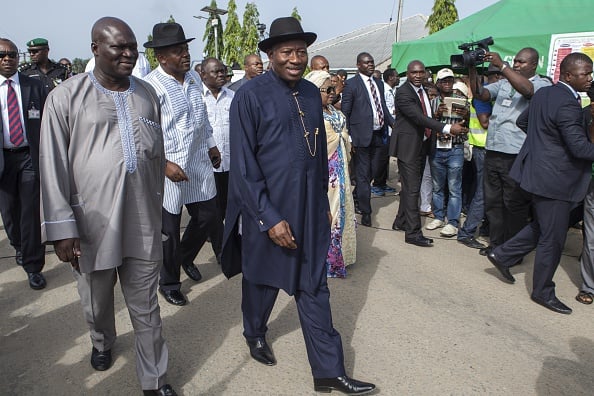What is Goodluck Jonathan's Net Worth?
Goodluck Jonathan is a Nigerian politician who has a net worth of $12 million. Goodluck Jonathan was the president of Nigeria from 2010 to 2015. From 2007 to 2010 he served as the Vice-President of Nigeria under Umaru Yar-Adua. When Yar-Adua passed away on May 5, 2010 Jonathan succeeded him to become the President of the Federal Republic of Nigeria. He was governor of Bayelsa State from 2005 to 2007. Upon his loss in the 2015 presidential election to Muhammadu Buhari, Jonathan became the first incumbent Nigerian president to concede an election defeat.
Goodluck Jonathan Wealth Debate
Upon being elected Vice President in May 2007, Dr. Jonathan voluntarily revealed his estimated personal wealth. At the time, Dr. Jonathan's 2007 net worth was reportedly equal to just over $8.5 million US dollars. Dr. Jonathan has since been criticized for not making more frequent public declarations of his wealth. Some reports have even claimed that Dr. Jonathan's personal net worth could be as high as $250 million. If that was true, Goodluck Jonathan would be one of the richest people in Nigeria, though he would still be quite a distance from the $20 billion net worth that makes Aliko Dangote the current richest person in Nigeria.
In October 2014, a Presidential spokesman disputed these higher end estimates and maintained that he "regularly declares his assets as required by Nigerian laws". The President's office also threatened to sue any website that mentioned these alleged higher end net worth estimates.
Early Life and Education
Goodluck Jonathan was born on November 20, 1957 in what was then the Eastern Region of British Nigeria, and is now Ogbia. He comes from a Christian family of canoe-makers, and is of Iljaw ethnicity. For his higher education, Jonathan went to the University of Port Harcourt, where he earned his bachelor's degree in zoology. He went on to obtain his master's in fisheries biology and hydrobiology from the same institution, and then his doctorate in zoology, also from Port Harcourt.
Career Beginnings
Prior to his political career, Jonathan worked a handful of different jobs. He served as an education inspector for a time, and was also a lecturer and environmental protection officer. From 1993 to 1998, Jonathan served as an assistant director at the Oil Mineral Producing Areas Development commission.
Governorship and Vice Presidency
In 1999, Jonathan took his first major political post when he was sworn in as deputy governor of Bayelsa, a state in southern Nigeria. He served in this position through 2005 alongside governor Diepreye Alamieyeseigha. When Alamieyeseigha was impeached on charges of money laundering in late 2005, Jonathan took over as governor of Bayelsa, a position he held through 2007.
Following his governorship, Jonathan became vice president of Nigeria under the Umaru Musa Yar'Adua administration. In addition to his cabinet meeting appearances, he served on the National Security Council, Federal Executive Council, and National Defence Council, and was the chairman of the National Economic Council. Notably, as vice president, Jonathan played a critical role in negotiating truces with various militant groups active in the Niger Delta.
Presidency
In early 2010, Jonathan was appointed the acting president of Nigeria due to the absence of president Umaru Musa Yar'Adua, who was in Saudi Arabia for medical treatment. When Yar'Adua passed away a few months later, Jonathan became the substantive Nigerian president. He went on to campaign for the official office, which he won in 2011. As president, Jonathan oversaw an array of government advances and reforms. On the economic side of things, Nigeria reconfigured its GDP to become Africa's largest economy. The country also had significant advances in infrastructure, including new railways, airports, and federal roads. To bring Nigeria a stable supply of electricity, Jonathan worked to privatize the power sector.

Getty
Controversies
Jonathan and his administration were highly controversial, provoking widespread claims of corruption. Before he even became president, Jonathan was accused of ordering $15 billion from the Central Bank of Nigeria under the false pretenses of national security, and instead using the money to support his campaign and other personal projects. After becoming president, he and his administration reportedly misused major sums of money on numerous occasions, with billions of dollars either vanishing or being distributed to high-ranking officials. Among other controversial actions, Jonathan signed into law the Same Sex Marriage Prohibition Act, which forbids homosexual relationships with severe punishment for violators.
During his presidential tenure, Jonathan was particularly controversial for what many perceived as his inability to secure the nation from terrorist threats, especially Boko Haram. That group carried out numerous bombings and other attacks while Jonathan was in office, leaving thousands of casualties in its wake. Protestors urged Jonathan to be more aggressive in his response to the terrorism, which continued to besiege the nation even as Nigeria and its allies staged counterinsurgencies.
Reelection Loss
In March of 2015, Jonathan lost reelection to his challenger Muhammadu Buhari, the former military head of state. He subsequently accepted his defeat, making him the first incumbent Nigerian president ever to do so in an election.
Post-Presidential Career
Among his post-presidential positions, Jonathan became an honorary special adviser to the Bayelsa Education Trust Fund Board in 2019. The same year, he became the chairperson of the newly created International Summit Council for Peace. In 2020, Jonathan was named as a special envoy of the Economic Community of West African States.
Personal Life
With Patience Jonathan, his wife, Jonathan has a son named Ariwera and a daughter named Aruabai.
/2014/08/GettyImages-467896020.jpg)
/2022/06/Rodrigo-Duterte.jpg)
/2015/06/Aliko-Dangote.jpg)
/2024/04/Herbert-Wigwe.jpg)
/2015/11/Xi-Jinping-1.jpg)
:strip_exif()/2020/06/taylor.png)
/2013/11/James-Toback.jpg)
/2018/01/Scott-Shriner.jpg)
/2021/02/Keri-Hilson.jpg)
/2023/04/Piper-Rockelle-1.jpg)
/2020/03/lil-kim.jpg)
/2021/01/mary-tyler-moore.jpg)
/2023/09/Elijah-Blue-Allman2.jpg)
/2010/01/shan.jpg)
/2012/04/Maureen-McCormick.jpg)
/2009/10/Michael-Phelps-1.jpg)
/2009/11/Ron-White-1.jpg)
/2014/08/GettyImages-467896020.jpg)
/2022/06/Rodrigo-Duterte.jpg)
/2020/04/cheney.jpg)
/2023/08/Lyndon-B.-Johnson.jpg)
/2015/07/fdr.jpg)
/2011/03/Mahmoud-Ahmadinejad.jpg)
/2015/11/Xi-Jinping-1.jpg)